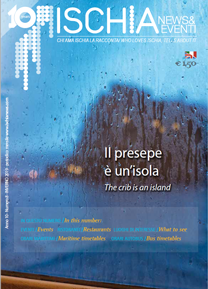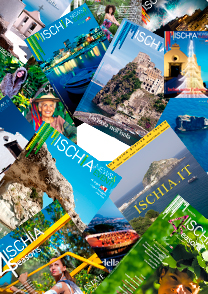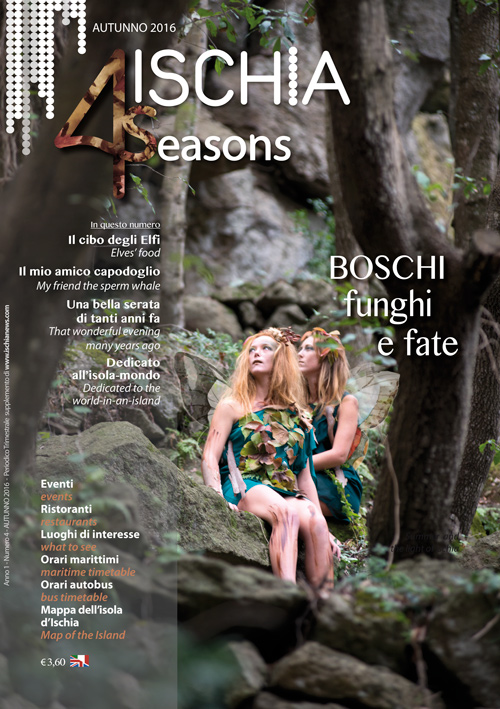Ischia at Christmas... after
 The time of “suspension” marked by holidays reveals a global custom, and a “need” to regenerate. Where? Obviously on the Green Island, following the ideal route among wonderful places. They are the synthesis of the fundamental principles of life, immersed in the magnificent ethic of hospitality. A “paradise” for health-conscious travelers, and not only.
The time of “suspension” marked by holidays reveals a global custom, and a “need” to regenerate. Where? Obviously on the Green Island, following the ideal route among wonderful places. They are the synthesis of the fundamental principles of life, immersed in the magnificent ethic of hospitality. A “paradise” for health-conscious travelers, and not only.
The feast of the Nativity is celebrated on December 25, ancient date of the winter solstice. Then astronomical phenomena and calendar reforms have anticipated this day on 21 December. However, it does not change: it is the sign that day extends and the light wins over darkness, with all the practical and symbolic implications that entails. Therefore, it is not only a Christian feast, but also a universal event, observed by almost all civilizations and religions.
The time of the festival is a time of suspension of the ordinary: people stop working, put on their best clothes, eat special foods, and perform ritual sacrifices and spiritual, physical and intellectual exercises. People leave the house to go elsewhere for a pilgrimage to the Holy Land, a trip out of town, a Christmas holiday in Ischia.
Yes, because if you really want to honor the spirit, the letter of Christmas, nothing better than a holiday in contact with nature, the word (like its Greek counterpart: fysis from fyo, “I was born”), whose etymology refers to generation: the God of the sun on the day of the solstice, that one of the Christian God on Christmas Day. So people can take advantage of the Christmas holidays to re-generate, mind and body, in the nature of Ischia.
Moreover, since nature has its inescapable equivalent in culture, and Ischia is volcanic island of ancient Greek colonization, it is inevitable to recall the so-called “physical” or “naturalist” men: the first Greek philosophers who opened the great age of thought in the West. Now, set the West according to the German philosopher Oswald Spengler undermined the thought according to the Italian philosopher Gianni Vattimo, an invigorating spa treatment can only invigorate. So here we are, with more than one good reason, both natural and cultural.
In fact, six centuries before the birth of Christ, three Turks of recent immigration from Greece (because of certain economic conditions of the motherland) thought naturally of wondering about the birth of nature: what is the archè of fysis, the beginning of everything? I am a simple soul and I could stop here. The greatness of philosophy, for me, is already all in this single question. Instead, those early philosophers have felt the need to be answered. In addition, like good southern and Levantine men, they responded in their own way, according to this intolerable attitude and individualist anarchist thinking on their own and opposing each other, typical of the Mediterranean peoples, wellspring of disorganization so we are sadly famous. Therefore, just to begin the history of philosophy, Thales has tracked the principle of nature in the water.
We have received many of his arguments on. In Ischia, do we really need it?
Its geographical statute makes water an element of identity, as if the earth traces boundaries, affects the climate, the economy, the mentality; it is a bulwark and connection, attraction and rejection. From the sea comes the existence, with the boarding merchant, fishing and beach activities. The pleasure comes from the sea, with navigation, the fresh fish and refreshing baths. From the sea comes the beauty. The Emerald Bay of San Pancrazio and the turquoise water of Scannella. The pink of the sun rising in the Bay of Cartaromana and the red of the sunset in Forio. The archaeological remains of the ancient Aenaria, the Roman city submerged near the rocks of St. Anna; the inspiration of the many artists who came to Ischia. From the sea comes the scientific research: on the right bank of the Port of Ischia, stands the Zoological Station Anton Dohrn, whose picturesque building guards, like a sentinel from cinnabar-colored uniform and silver helmet, on the azure expanse of water between Ischia and Procida, which is, in its narrow frame, all living species in the Mediterranean Sea. From the sea comes the isolation, preserving local traditions; from the sea come the taste for cultural exchange and ethics of sailor hospitality, who made the island one of the most popular destinations for international tourists.
To do justice to good old Thales, in Ischia there are also rainwaters: it often rains in Ischia: on the east side, twice as much that on the west side. This for a Christmas traveler might look a drawback. However, for the naturalist traveler are just the precipitations that allow the luxuriance of the vegetation that has made Ischia so famous, so having earned the nickname of “Green Island”. For the health-conscious traveler the precipitations from above, together with the marine seepage from below, supply water to the hot springs. Finally, for the philosopher traveler few rainy days are an opportunity to stop and read, reflect, meditate.
Maybe on another philosopher, Miletus (ie Greek migrated to Turkey) like Thales, Anaximenes, who has decided to revive the birth of nature in the air, both “atmosphere” and “vital breath”. Here we are in Ischia and the meanings of “air” is merely vast: wind for sailors and anglers, breeze for hot vacationers, residence for the rich bird fauna. Multicolored butterflies, fireflies, productive bees, songbirds and game pace, lucrative hunting reserve for hunters; vehicle for the natural scents of abundant and colorful blooms and fragrances suffused by the local culinary culture; sauna vapors and inhalers for spa tourists and breathing restored for asthmatics came here to be cured; sigh sorry to those from Ischia and part suffers immediately nostalgia.
It is Christmas, it is time of holidays and schools are closed (even philosophical), perhaps old masters Thales and Anaximenes will be in Ischia, tried to restore the physical age. Both enthusiasts of meteorology, start talking about the weather, maybe immersed in the tanks of the rocky bay of Sorgeto, where pools of boiling water allow sea baths in winter. Such is the power of thought and of nature that could even happen that the principle of one, the water, and the principle of the other, the air, meeting in December, create snow!
In addition, about the third natural philosopher, Anaximander? He has identified the origin of all in àpeiron, a mysterious entity whose name would be mean “unlimited”, “infinite”, and therefore “indefinite”: a concept more metaphysical than physical, more spiritual than natural. However, philological studies suggest another hypothesis, a simplistic hypothesis of earth, clay, "eperu" in Akkadian, the language of the Assyrian-Babylonian civilization (now it seems the Syrian-Iraqi, oddly enough!), by which the Greeks entertained continuing trade and cultural exchanges. Who then can appreciate more than Anaximander Ischia, earthy Island, more agricultural than marinara, where Eubei, in the eighth century B. C., led practices of vines-wine still alive, thanks to wineries D'Ambra, Cenatiempo, Tommasone, Calise, Mazzella, Pietratorcia Gardens Arimei. Isle of land to cultivate and ground to shape, as evidenced by the valuable collection of artifacts housed in the Archaeological Museum of Pithecusae: Pithecoussai, the island of the vessels, the green name of Ischia. Island of land that cures: Anaximander can only take advantage of the mud therapy, therapeutic practice thousands of years here. Expert of telluric phenomena, he will find in Casamicciola the ancient geophysical observatory in Sentinella, which still preserves the nineteenth century tools for seismic surveys. The right man at the right place at the right time: it was Anaximander, experienced astronomer, to discover the solstices and equinoxes.
Christmas in Ischia, straggling with philosophical speculation, and with three of the four natural elements constituting of the proverbial all. The fourth, the fire, where are? In Ischia, underground, to warm thermal waters. In philosophy, we associate him mainly to Heraclitus of Ephesus (again Turkish immigrant, of a second generation) who discovered in fire the principle of nature: if he visits Ischia, that from the volcanic fire has its own training, will draw that confirmations anywhere.
Heraclitus lived and advised to live in the woods. Therefore, here in Ischia we recommend the woods of La Maddalena and Falanga. In addition, because he spent a period at the Temple of Artemis, perhaps the most mystical one of the Presocratics, we recommend also that one of Zaro, where on 26 of every month a Marian apparition occurs, a perfect synthesis between the natural and the supernatural that would make happy Spinoza.
However, not only of uncultivated nature is made Ischia, but also of gardens, vegetable gardens and orchards: those historically reconstructed of the Castello Aragonese, Pineta Mirtina those public parks and botanical gardens of La Mortella and Ravino. You will find so comfortable Plato, whose Academy took its name from its location, the public park donated by Athens to hero Academos; and Aristotle who held his lectures walking outdoors; and Epicurus, from Samos (in Turkey, if geography is not an opinion), whose doctrine is called “philosophy of the garden”, because he taught inside the garden. Since this thinker, unjustly accused of hedonism, but actually devoted only to the most frugal pleasures, suffered from kidney, will drink at the wellsprings of Piellero and Ciglio.
On the relationship between God and Nature, so many philosophers have express opinions. Among these, there is William of Occam, English empiricist of the fourteenth century who into his travel will bring his razor, simple logical tool to eliminate the superfluous. Instrument applicable on the island: the miraculous water of Nitrodi that soothes any abrasion, even cutting off all.
Ischia is not only nature, Erasmus will find here enough madness to commend wandering in the chaos of Christmas shopping, along the showcases of important boutiques that illuminate the streets of Ischia Porto, Lacco Ameno, S. Angelo.
For those who, tourists or thinkers, just could not be located in Ischia in December?
They may come in September to celebrate the Festival of Philosophy!


























